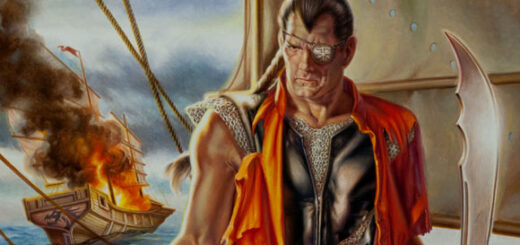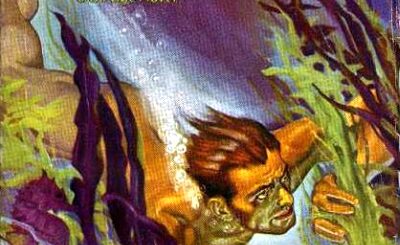Jiu San
A malevolent new leader has risen to terrorize the Western world. No one knows who he is. Doc, his crew, and a blonde war correspondent risk everything to find out. But to get the answers, they must face the death-dealing powers of a madman on the nighttime streets of a city known for its bloodthirsty killers — Yokohama!






Doc as an agent for the US government was an inevitable direction for the series to take. This one sends Doc to Yokohama. And the story is compelling. Doc is undercover, trying to form a coalition of Japanese to take over the country when it collapses because of the war effort. The action is good and there’s lots of intrigue. Two thumbs up for this Doc adventure.
This one doesn’t quite measure up in my book. I like Doc and Monk creeping into occupied France but the mystery is anything but thrilling and the “explanation” not very satisfactory. If the future-seeing herb could be proven one way or the other, this one might have been better. Average Doc.
Jui San is one of those later intense Docs, more gritty, more realistic, and more political. But it is also one of the more fascinating, because of several facts. It has Doc and crew not only working for Uncle Sam undercover, but willfully destroying their reputations on an international scale. Ham gets to really shine in this one and you sense his skill, great intelligence, and charismatic mastery moreso than in a lot of tales. He isn’t just the shyster sidekick of Monk. It is also another of the more experimental tales to feature a co-lead POV character, which is this case is a female reporter, so that the average joe reader is swept along in the tide of action. But one of the more fascinating aspects is its treatment of the subject matter at hand. Akin to tales like The Lost Giant, it tackles some very serious international political issues, which were very real and very vital to the world, and solves the conundrum of the entire future of Japan. This is amazing stuff for anyone to consider, much less work out in the pages of a short action thriller pulp. I was impressed.
Some moments: A very nice insider line when the reporter is discussing the image of Doc Savage: “It’s pretty wild stuff you hear,” Monk told her. “But, the funny part is, the real facts are usually even wilder.” (Bantam p 34) Wilder? You think? Understatement of the century, and all the sweeter since Monk delivered it straight-faced. He goes on to have a very nice admission about himself and Ham (acting like juveniles and always lying about each other) and to be admired for his loyalty to Doc, despite the fact that at this point in the book Doc is a vile traitor to America. But in return, the reporter psychoanalyses Monk and provides one of the best summations of his character in the entire series: The guy was blunt, two-fisted, but he had brains. She thought she knew what had made him a somewhat cockeyed character. It was his looks. A fellow so homely was bound to be different. When you were so homely, you went through life taking a lot of things off people, wisecracks and such, or just knowing from the way they looked that they thought you were a freak. (p 35) Also, in another rarity, Doc falls for the girl and Monk and Ham lose a thousand dollar bet when he asks her out. Schwing!
One last thought: Dig the incredible power and savagery of the pulp cover! Wowzers. That is one vicious human being. The Bantam art, while eye-catching, is like kind old Uncle Bob next to the pulp cover.
Thomas Fortenberry
I’m not really a great fan of the wartime adventures, I must say, but this does have a couple of good things going for it. Firstly, Carla Trotter, semi-two-fisted newspaperwoman, a great character I’d like to see more of. Secondly, the mission Doc’s on for the Government: liasing with a potential post-war Japanese government. I was genuinely surprised to see some sort of admission in a pulp novel published in the middle of WWII that one day the war’ll be over, the allies will win it, and – get this – they’ll have to get on with the remnants of the country they’ve just defeated, not all of whose inhabitants are cold, bloodthirsty murderers or imperialist/fascist psychopaths. Top marks to Lester Dent!
Monk and Ham are the only aides present, and being one of the wartime novels, they are, like Doc, begining to show their more frail and human side rather than acting as comic sidekicks to Doc the superhero.
As a novel, it’s quite suspense-packed. Lots of nice little Dentisms throughout, as well.